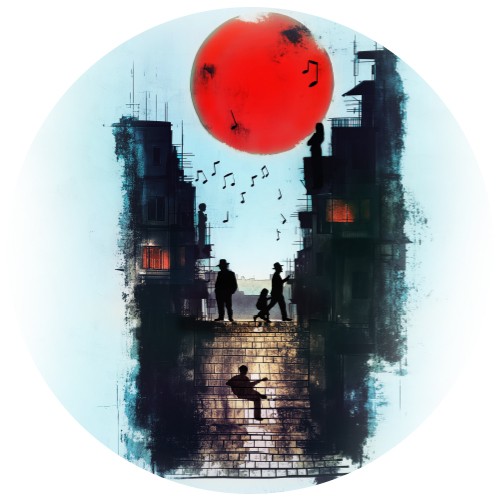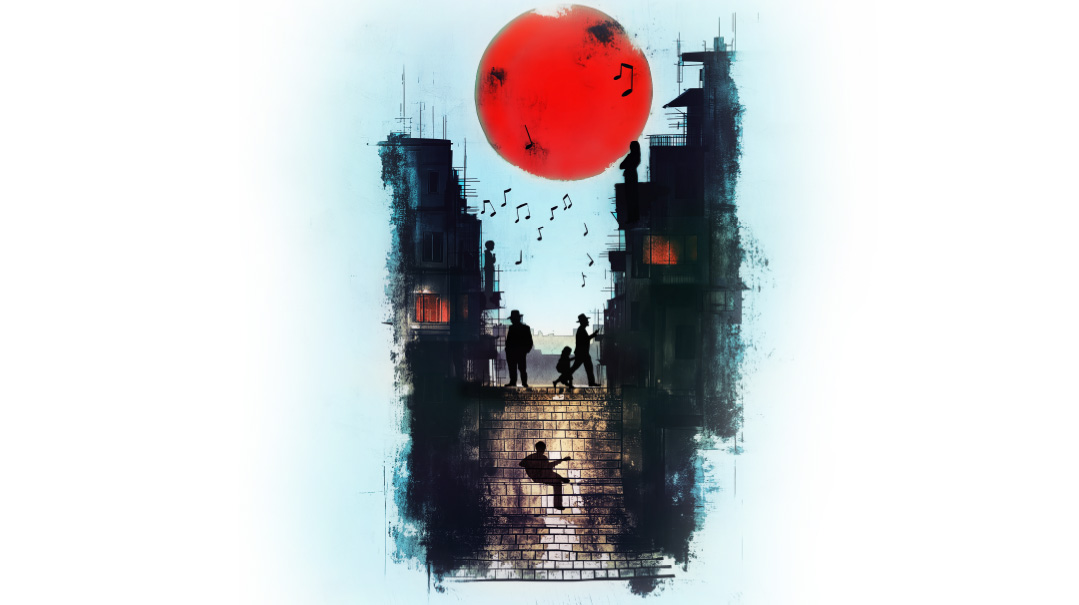Face the Music: Chapter 4

“When I went to people for Shabbos, they showed me something completely different from my mom’s version”

“This isn’t going to work,” Tamar said, frowning, as she studied herself in the mirror.
Marissa looked at her daughter’s reflection, which always reminded her so much of Yaakov: dark, deep-set eyes, lanky build, strong chin bespeaking strong opinions. The dress she was wearing looked nice enough to Marissa — a dark print with some interesting detail on the sleeves.
“It fits fine, doesn’t it?” she asked. “Why won’t it work?”
Tamar shrugged. “It just doesn’t,” she said shortly. “I know.”
She marched back to the dressing room to try on the next item in the considerable pile she’d assembled. Marissa tried taking a deep breath, but something inside her felt constricted. She spotted a gray chair off to the side of the mirrors and sank into it.
Tamar emerged again, this time in some sort of tweed set. She scrutinized her reflection. The fabric made Marissa picture a grandpa in suspenders and spectacles with a handkerchief in his pocket. She wondered why a pink-cheeked teenage girl in Yerushalayim would want to dress like a stuffy professor. But Tamar didn’t ask her opinion, so she kept her mouth shut.
Tamar turned sideways and smoothed down the skirt. Then she went back to the dressing room and repeated the charade again. And again. After 20 more minutes sitting there invisible on the gray chair, Marissa finally watched Tamar come out, holding three items in triumph. One was that horrible tweed set.
“Can we pay now?” she asked.
Marissa nodded. She hated shopping, always had. When she was growing up, she’d been able to keep it to a minimum — her wardrobe had consisted of a few pairs of jeans, some sweaters and tees, and one or two nicer pieces. Tamar was a different animal. Even as a little girl in kindergarten, she had evinced this inborn sense of style. As she grew older, she delighted over colors and textures, cuts and trimmings. Marissa found it hard to fathom how someone could actually enjoy riffling through the racks at a clothing store — but here was her own daughter, clearly in her element as she laid down her choices on the counter.
“That’ll be one thousand, eight hundred twenty-eight,” the salesgirl said.
Marissa watched her hand remove the credit card from her wallet and lay it on the counter. So much money, whoa. For a few dresses.
Tamar grabbed the bag with her new purchases and began walking out.
“Thanks, Ima,” she said with sudden warmth. “Can we do the shoe store next?”
Two decades earlier, Marissa had spent Shabbos at Rebbetzin Grossinger’s home in Mattersdorf. She could still conjure up the smell of fresh potato kugel and cinnamon cake that had embraced her the moment she’d walked in.
“You’ll be staying in the girls’ room,” Rebbetzin Grossinger said, leading her down a narrow hall. “Chani, Esther, here’s our guest. Can you pull out the bed and get it ready for her?”
Marissa watched, bemused, as the two smiling teenagers pulled a bed out from under their own wooden bunkbed and expertly draped it in fresh linen.
“Here,” one of the girls said with a wide, welcoming smile as she opened the closet door. “You can hang up or put away whatever you need — there should be some room on the shelf. And then we’ll get you a plate of kugel, so you won’t starve until the Shabbos meal.”
Marissa put down her backpack and peered inside the closet, where two stacks of neatly folded shirts shared space with a box of tights. Six or seven dresses and a few skirts hung on hangers on the rack. That meant each girl owned three or so dresses, no more.
Now, standing on Rechov Yirmiyahu with her teenaged daughter at her side, she looked at the chaotic traffic, the street lined with glass display windows, the streams of humanity grasping their shopping bags of more and more and more clothing, and mentally compared it to that scene: the spare wardrobe in the Grossinger girls’ closet, the aroma of potato kugel filling every crevice of the apartment, the beams of sunshine on the wooden bunkbed. The wholeness of that simple lifestyle spoke to her. It was everything she had wanted.
Of course she wanted Tamar to have beautiful Shabbos clothing. And shoes. And probably another batch of weekday clothing, if she knew Tamar.
Still… after all those years Marissa had spent seeking, discarding, negotiating with her parents and her conscience to remake her identity — to get this?
“Good Shabbos, see you later,” Perri said as Chaim headed to the door with Shloimy and Dovid. Yechezkel was still looking for his missing Shabbos shoe, of course.
“Good Shabbos, everyone,” Chaim said.
Perri found the missing shoe and sent Yechezkel out to shul. She shut the door gently and sank into the couch, joining Simi and Miriam. “Here, come join us, Chaya Rivky,” she said, patting the couch.
Chaya Rivky needed no urging. She plopped down next to her cousins.
“Tell us all about seminary!” Perri said. “Anything exciting happen this week?” Chaya Rivky was her first niece to come to seminary in Yerushalayim, and Perri was enjoying her dramatic reports of dorm life, tiyulim, and amaaaaazing classes.
“Yes! The craziest thing happened to my friend Rikki,” Chaya Rivky answered obligingly. “She wanted to visit this aunt of hers on Rechov Petach Tivkah, so she hailed a taxi, and the nahag started driving, and suddenly she realizes that they’re on the highway, which is a little weird, right? After like, I don’t know, maybe twenty minutes?, she asked the driver, ‘eifoh atah holech,’ you know, like, where’s he going? Rechov Petach Tivkah is right near Shefa, isn’t it? And the driver’s like, don’t you want to go to Petach Tikvah? And she totally did not get that Petach Tikvah is the name of an actual city. Isn’t that the craziest?”
Simi laughed. “Seminary girls are so funny,” she said.
“Wait, girls, is someone knocking?”
Miriam went to check. “It’s Mrs. Markowitz,” she said, as she opened the door for Marissa.
“Marissa, good Shabbos, so good to see you. Why don’t you sit down?” Perri said, motioning to the gray loveseat. “This is my niece Chaya Rivky. She’s in seminary here in Yerushalayim for the year. Chaya Rivky, this is my neighbor Marissa Markowitz.”
Marissa and Chaya Rivky traded smiles.
“How’s seminary going? Is it a hard adjustment?” Marissa asked.
“Not so hard,” Chaya Rivky said. “It basically feels like camp. You know — tons of girls staying up late, singing, sharing clothing….”
“At some point you have to learn and study, no?” Perri asked.
Chaya Rivky shrugged. “Yeah, I guess. Maybe my seminary is just not so intense.”
“Is it hard to have to keep finding Shabbos meals?” Marissa asked. “When I went to seminary, that part was a big deal for us.”
“Well, I have Tante Perri and Uncle Chaim,” Chaya Rivky said.
“Right! You can always come to us!” Simi said.
“And it’s great,” Chaya Rivky agreed, “because the zemiros sound the same, and the food is basically the same, and half the kids’ names are even the same — it’s almost like I’m at home. That’s, like, the dream, no? To be in Yerushalayim but still have Shabbos meals that feel like you’re back home.”
Marissa half-smiled. “Not for everyone,” she said. “I don’t have the same background as you, so when I went to people for Shabbos, they showed me something completely different from my mom’s version. Believe me, it was a huge improvement! A real Shabbos! Not just lighting some candles, a quick dinner, and then back to the TV. It felt like magic to me, this whole different existence where the family was the focus, and the meals just overflowed with so much meaning and warmth. You can’t imagine.”
Chaya Rivky’s eyes went wide. “I— I can’t,” she conceded.
“Is someone knocking again?” Perri asked.
Miriam went to the door. “Mrs. Markowitz, it looks like Yosef Shalom is here to get you.”
Marissa rose from the loveseat. “I guess my husband got home a bit earlier than yours,” she said. “Good Shabbos.”
“Good Shabbos,” Perri said, rising and walking her neighbor to the door. “Thanks so much for dropping by. Maybe we’ll get in a visit tomorrow.”
A few minutes later, Chaim and the boys came home from shul and launched into the familiar routine of Shalom Aleichem, Kiddush, and challah. From the corner of her eye, Perri watched Chaya Rivky. Was her family’s Shabbos meal really just like the Weiss seudos in Monsey? Did they serve the same dips? Did Chaim’s brother Yechiel also struggle to keep his kids at the table?
“So, Shloimy,” Chaim said when he finished his slice of fish. “What happened in yeshivah this week?”
Shloimy shrugged. “Nothing really.”
“Yechezkel, Dovid, who knows the parshah this week?” Chaim tried again. “Do you have some questions from your rebbi?”
Dovid sighed. “Can’t we just wait for Avos U’Banim?”
Chaim nodded. “Okay. We can. So here’s a vort that one of the guys in the kollel told me. It says in the parshah….”
Perri watched her family while Chaim spoke. Shloimy’s fingers were beating out a tap-tap-tap on the tablecloth; he was probably singing silently to himself. Yechezkel had wandered off to the couch and pulled a book out from behind the cushions. Simi and Miriam seemed to playing some sort of game that revolved around a napkin they were passing back and forth. Perri remembered Marissa’s description of the Shabbos meals that had spoken to her, back when she was first becoming frum. This whole different existence where the family was the focus, and the meals just overflowed with so much meaning and warmth.
Her Shabbos table felt very far from that ethereal vision.
“Ma, where’s the soup already?” Dovid asked.
“Tatty’s saying a vort!” Perri snapped. Then she caught herself. “You’re hungry, tzaddikel, I know. Tatty will finish and then I’ll go get the soup.”
With her eyes, she tried signaling to Chaim to speed up a bit. He kept going.
Finally, she headed to the kitchen with a stack of fish plates in her hand. Chaya Rivky followed.
“Here, let me help you,” she said, taking the stack.
“Thanks,” Perri said appreciatively as she removed the big pot of chicken soup from the hotplate. “Can you take care of those while I ladle out the soup?”
“Sure,” Chaya Rivky said. “Your soup smells heaven. By the way, who’s that lady who was here before? Melinda, Miranda, was that her name?”
Perri felt slightly defensive. “Her name is Marissa Markowitz. She’s been our neighbor for years. The nicest people.”
“I know!” Chaya Rivky said with a fervor that surprised Perri. “She was legit inspiring! Like, the way she talked about Shabbos… she should totally come speak in seminary! People like that — they really know what it means to appreciate Shabbos. They’re, like, so authentic, right?”
“Mm-hmm,” Perri agreed as she ladled out the hot soup.
Not like us, she thought. We’re just a facade.
To be continued….
(Originally featured in Mishpacha, Issue 1036)
Oops! We could not locate your form.



